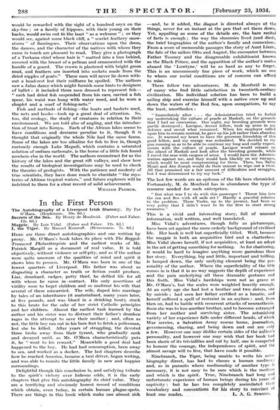African Lakes
IN the past few years two African expeditions have been under- taken, as a result of which all the lakes of Kenya and Uganda received a thorough preliminary survey. The scientific findings have been published in their appropriate forms and places. A more general account of the expeditions is now given, and it enables the ordinary reader to get some idea of the scope of modern scientific exploration. The lakes were con- sidered from the geological point of view ; their depths were measured, and their waters analysed ; the various plants and animals which live in or on them were studied ; some attention was paid to the customs of the natives ; all these different subjects were considered in regard to the past and future as well as the present ; and this was not merely a search for know- ledge, but for the ways in which the knowledge gained could be applied to the practical uses of everyday life. How different are such explorers as Dr. and Mrs. Worthington from those travellers who have so often gone to Africa only to slaughter the fauna, and have then hurried home and exchanged the gun for the pen in order to assure us of their own intrepidity-when charged by a pachyderm with a " wicked little eye," the head of which beast they have hung, together with the crowning glories of " tsessebe, koodoo, buffalo, bongo," on the walls of some stuffy billiard-room !
The authors visited places where probably nobody has ever been before, such :as Crocadile Island in Lake Rudolf. They landed in a bay of black lava shingle, where thousands of Caspian terns "continued to bill and coo as if nothing unusual had tapPened." They found crater-lakes containing huge turtles, and a large crocodile, suitably enough, as monarch of the island. The heat was very great, and the approach to El Moitat, on the eastern shore of Lake Rudolf, was " like ap- proaching a mountain of red-hot iron . . . it was as if someone had opened the door of an over-heated oven as the wave of reflected heat enveloped, us." "But, in spite of hardships, they would be rewarded with the sight of a hundred oryx on the sky-line ; or a family of .hippoes, with their young on their backs, would swim out to the boat " as a welcome ".; or they would see, against some black cliff, a " scarlet feathery snow- storm " of flamingoes. Their observations upon the dress, the dances, and the character of the natives with whom they came in touch are pleasant to read. They give a photograph of a Turkana chief whose hair is " matted into a bun behind, covered with the breast of a pelican and ornamented with the handle of a gourd. The crown is plastered with bright green mud, and feathers are inserted into sockets made from the dried nipples of goats." These men will never lie down with- out a head-rest lest their coiffures be, spoiled. The authors saw a Jaluo dance which might furnish some hints to designers. of ballet : it included three men dressed to represent fish- " each had dried fish suspended from his ears, carried a fish spear, his waist was hung with water weed, and he wore a chaplet and a scarf of fishing-nets."
Fish and methods of fishing—the boats and baskets used, the nets and hooks—took up a great deal of attention. So, too, did ecology, the study of creatures in relation to their environment. We are told also of angling, and the introduc- tion of trout into Kenya. Each of the African lakes seems to have conditions and denizens, peculiar to it, though it is thought that originally the whole Nile had the same fauna. gome of the lakes are too alkaline for fish to live in, though curiously enough Lake Magadi, which contains a saturated Solution of sodium carbonate, is the home of a little fish found nowhere else in the world: The authors reconstruct for us the history of the lakes and the great rift valleys, and show how the results of biological investigations may be used to check the theories of geologists. With the patience and modesty of true scientists, they have done much to elucidate " the mys- teries of African tropical waters," and future explorers will be indebted to them for a clear record of solid achievement.
WILLIAM PLomEn.

















































 Previous page
Previous page